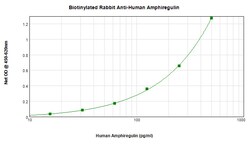Learn More
Amphiregulin Polyclonal Antibody, Biotin, PeproTech®, Invitrogen™
Rabbit Polyclonal Antibody
$250.00 - $2175.00
Specifications
| Antigen | Amphiregulin |
|---|---|
| Concentration | 0.1-1.0 mg/mL |
| Applications | ELISA, Western Blot |
| Classification | Polyclonal |
| Conjugate | Biotin |
| Catalog Number | Mfr. No. | Quantity | Price | Quantity & Availability | |||||
|---|---|---|---|---|---|---|---|---|---|
| Catalog Number | Mfr. No. | Quantity | Price | Quantity & Availability | |||||
500P322BT25

|
Invitrogen™
500P322BT25UG |
25 μg |
Each for $250.00
|
|
|||||
500P322BT50

|
Invitrogen™
500P322BT50UG |
50 μg |
Each for $319.00
|
|
|||||
50-271-8509

|
Invitrogen™
500P322BT500UG |
500 μg |
Each for $2,175.00
|
|
|||||
Description
AA Sequence of recombinant protein: SVRVEQVVKP PQNKTESENT SDKPKRKKKG GKNGKNRRNR KKKNPCNAEF QNFCIHGECK YIEHLEAVTC KCQQEYFGER CGEKSMKTHS MIDSSLSK. Preparation: Produced from sera of rabbits immunized with highly pure Recombinant Human Amphiregulin. Anti-Human Amphiregulin-specific antibody was purified by affinity chromatography and then biotinylated. Sandwich ELISA: To detect Human Amphiregulin by sandwich ELISA (using 100 μL/well), a concentration of 0.25-1.0 μg/mL of this antibody is required. This biotinylated polyclonal antibody, in conjunction with PeproTech Polyclonal Anti-Human Amphiregulin (500-P322) as a capture antibody, allows the detection of at least 2000-4000 pg/mL of Recombinant Human Amphiregulin. Western Blot: To detect Human Amphiregulin by Western Blot analysis, this antibody can be used at a concentration of 0.1-0.2 μg/mL. When used in conjunction with compatible development reagents, the detection limit for Recombinant Human Amphiregulin is 1.5-3.0 ng/lane, under either reducing or non-reducing conditions. 500-P322BT-1MG will be provided as 2 x 500 μg
Amphiregulin (AR) binds to EGF-Receptor (EGFR) with lower affinity than EGF. The mature secreted form AR is an 84-amino acid residue glycosylated polypeptide growth regulator, which is generated by proteolytic processing of a 252-amino acid transmembrane precursor. Seven different polypeptide ligands, which derive from distinct genes, are capable of binding to the extracellular domain of EGFR. These ligands include EGF, TGFalpha, AR, HB-EGF, cripto-1, epiregulin, and betacellulin. All of these growth factors contain a characteristic EGF-like domain which is defined by 6 evenly spaced cysteine residues that generate 3 loops through the formation of disulfide bonds. AR protein has been localized by immunohistochemistry to the epithelium of the colon, stomach, pancreas, breast, and placenta. AR is reportedly overexpressed in human cancers of breast, colon, stomach, and pancreas.Specifications
| Amphiregulin | |
| ELISA, Western Blot | |
| Biotin | |
| Rabbit | |
| Human | |
| P15514 | |
| 374 | |
| E.coli-derived Recombinant Human Amphiregulin. | |
| Antigen affinity chromatography | |
| AREG |
| 0.1-1.0 mg/mL | |
| Polyclonal | |
| Lyophilized | |
| RUO | |
| PBS with no preservative | |
| amphiregulin; amphiregulin B; AR; AREG; AREGB; colorectum cell-derived growth factor; CRDGF; Mcub; MGC13647; schwannoma-derived growth factor; SDGF | |
| AREG | |
| Primary | |
| -20°C |
The Fisher Scientific Encompass Program offers items which are not part of our distribution portfolio. These products typically do not have pictures or detailed descriptions. However, we are committed to improving your shopping experience. Please use the form below to provide feedback related to the content on this product.


